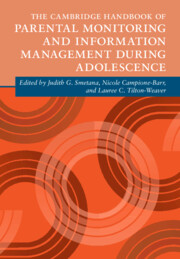Book contents
- The Cambridge Handbook of Parental Monitoring and Information Management during Adolescence
- Cambridge Handbooks in Psychology
- The Cambridge Handbook of Parental Monitoring and Information Management during Adolescence
- Copyright page
- Dedication
- Contents
- Figures and Tables
- Contributors
- Acknowledgments
- Part I History of the Field and Theoretical Frameworks
- 1 A Historical Overview of the Field
- 2 Privacy Invasion and Communication Theories
- 3 Parenting and Adolescent Information Management from the Social-Cognitive Domain Theory Perspective
- 4 How Can Parents Monitor Adolescents’ Activities and Encourage Volitional Disclosure?
- 5 Bidirectional Models and Transactional Approaches to Parental Monitoring
- Part II Reconsidering Parenting and Parental Knowledge
- Part III Informant and Contextual Differences in Disclosure and Secrecy
- Part IV Applications
- Index
- References
4 - How Can Parents Monitor Adolescents’ Activities and Encourage Volitional Disclosure?
A Self-Determination Theory Perspective
from Part I - History of the Field and Theoretical Frameworks
Published online by Cambridge University Press: 12 December 2024
- The Cambridge Handbook of Parental Monitoring and Information Management during Adolescence
- Cambridge Handbooks in Psychology
- The Cambridge Handbook of Parental Monitoring and Information Management during Adolescence
- Copyright page
- Dedication
- Contents
- Figures and Tables
- Contributors
- Acknowledgments
- Part I History of the Field and Theoretical Frameworks
- 1 A Historical Overview of the Field
- 2 Privacy Invasion and Communication Theories
- 3 Parenting and Adolescent Information Management from the Social-Cognitive Domain Theory Perspective
- 4 How Can Parents Monitor Adolescents’ Activities and Encourage Volitional Disclosure?
- 5 Bidirectional Models and Transactional Approaches to Parental Monitoring
- Part II Reconsidering Parenting and Parental Knowledge
- Part III Informant and Contextual Differences in Disclosure and Secrecy
- Part IV Applications
- Index
- References
Summary
In adolescence, an important challenge for parents is to keep track of their adolescents’ behaviors and to create conditions in which adolescents disclose relevant information about themselves. According to Self-Determination Theory (SDT), dynamics of autonomy play a central role in both the effectiveness of parental monitoring and adolescents’ willingness to disclose toward parents. This chapter provides a review of SDT-based studies on parental monitoring and adolescent disclosure. This research begins to show that, whereas autonomy-supportive communication increases the potential benefits associated with parental monitoring, controlling communication of monitoring is rather counterproductive. Further, adolescents disclose more often toward parents and do so more willingly when parents are perceived as autonomy supportive (rather than controlling). In conversations about unfamiliar topics, adolescents additionally benefit from parental support for competence (i.e. guidance). Studies also highlight adolescents’ agency in the dynamics of monitoring and disclosure. Implications for practice and directions for future research are discussed.
- Type
- Chapter
- Information
- The Cambridge Handbook of Parental Monitoring and Information Management during Adolescence , pp. 68 - 89Publisher: Cambridge University PressPrint publication year: 2024

